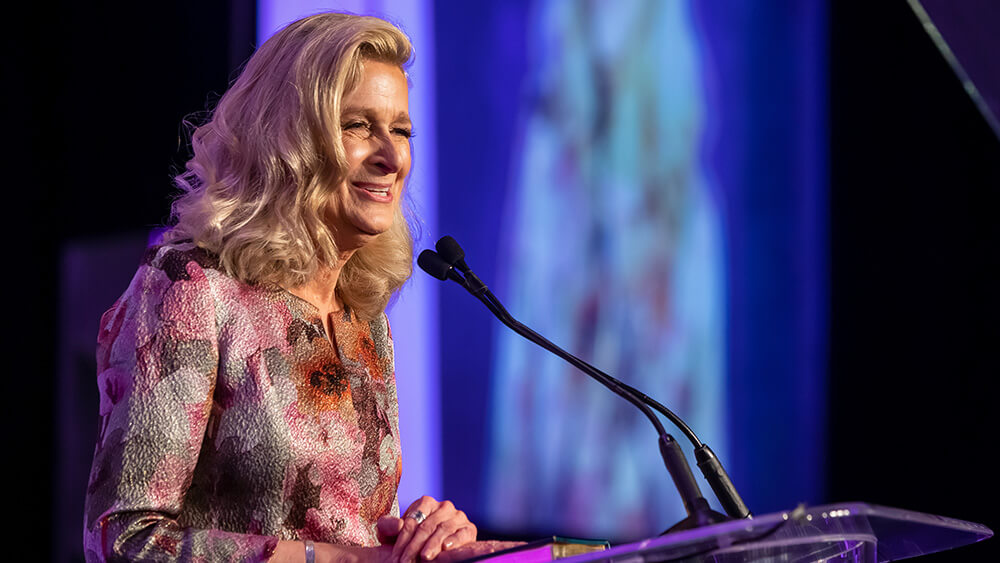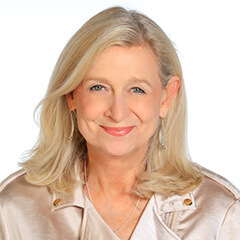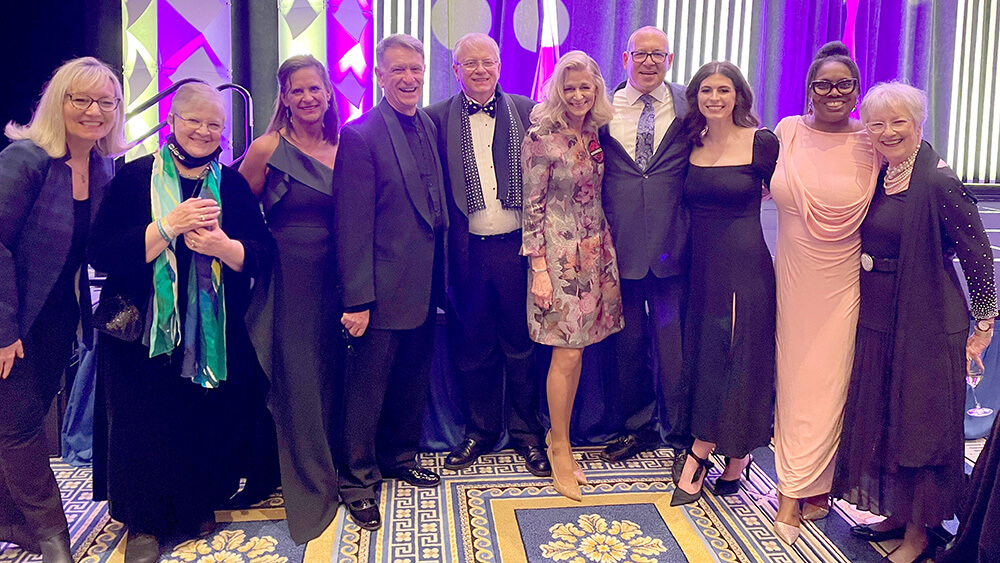
Kitty Ratcliffe accepts her Lifetime Achievement honor at PCMA’s Visionary Awards in 2022. Ratcliffe retired this year after 42 years in the tourism and events industry. (EPNAC photo)
Kitty Ratcliffe started out working in retail but it wasn’t long before she found her true calling. After she had complained to her dad about working 12-hour days and 7-day workweeks at a shopping mall, Ratcliffe said he called her with a job lead — Carbondale, Illinois, was looking for a director for its tourism bureau. “I asked him, ‘What’s a tourism bureau?’” Ratcliffe told Convene, and then questioned why the organization would even consider her as a candidate since she lacked relevant experience. His response: “Do you think anybody who knows anything about tourism is going to move to Carbondale to do it?”
Ratcliffe said she “bluffed her way” through the interview and landed the job, where she worked for four years until she was approached by the then-president of the St. Louis CVB for a convention sales job. “I got the job and moved to St. Louis,” Ratcliffe said, adding, “I’ve just been lucky all the way through. I was given opportunities and made some decisions about taking advantage of those opportunities and learned my craft along the way. It’ll be 42 years in November since I took that job in Carbondale,” she said. The industry “has been pretty darn good to me.”
Over the span of those four decades, Ratcliffe has racked up numerous honors and awards, including receiving PCMA’s Lifetime Achievement Award in 2022 and being inducted into Destinations International’s Hall of Fame in 2019, along with a host of regional leadership recognitions — proof that Ratcliffe might have bluffed her way into the industry but has proven herself ever since. Receiving those awards “are some real highlights for me,” she said. “I didn’t really expect any of that. I still struggle, I think, a little bit with that imposter syndrome, even after all these years.”
Aside from working as the director of marketing for a 740-room convention hotel in downtown Denver for a year and a half, Ratclliffe has spent her entire career working in leadership roles at DMOs. She left Denver to become director of marketing at the Baltimore CVB, where she worked for Wayne Chappell — “the best boss I ever had,” Ratcliffe said. “He took a challenge and he made it fun. Then he left Baltimore and took a different job in another city. It was right at that time that I was incoming chair of MPI. As soon as that volunteer position was over, I moved to be the president of the Jacksonville & the Beaches CVB.” A little more than six years later, she became executive vice president of the New Orleans CVB; and two years later, in 2006, she was named president of the St. Louis Convention & Visitors Commission.

There is so much more about the industry that you really only learn when you expand your network. The best way to expand that network is through industry associations.”
Making Moves, Building Relationships
“I’ve moved around a bit, but all good places, all great jobs, all further extensions of what I had done in the previous job,” Ratcliffe said. “Each one gave me new things to learn, new experiences to have, new mistakes to be made [laughs]. It’s never been boring. There’s certainly been issues that we’ve had to deal with where there’ve been incredible challenges.”
What Ratcliffe said she has appreciated most about the DMO industry is that it’s a close-knit community. “We all know each other and we all recognize that we have very similar problems and oftentimes we’re in the exact same boat — think 9/11 or COVID. We [share] ideas on how to handle it or just even to commiserate. Your family and your friends do not understand at all what you do, but your colleague on the other side of the country — or even on the other side of the world, in the case of COVID — understands exactly what you are dealing with.” Ratcliffe added that the industry has “given me lifelong relationships that I’m truly grateful for.”
The Value of Volunteering
“When I started in the industry, I really didn’t know my job, and within the first two months, I had joined both PCMA and what is now Destinations International,” Ratcliffe said, “and then MPI four or five months later.” Joining and volunteering at industry organizations, she said, “is instrumental in being able to help you define the job that you have, to understand the landscape beyond the little world that you might be living in — whether your world is a hotel, or it’s a DMO, a convention facility, or it’s another type of supplier to the industry. There is so much more about the industry that you really only learn when you expand your network. The best way to expand that network is through industry associations.”
How DMOs Have Evolved
The only competition DMOs had when she began her career “was a travel agent, which was a commissionable purchase,” Ratcliffe said. “We really had no competition in terms of overall information that we had on our communities. That is, obviously, no longer the case. Our biggest competition today isn’t a person or an organization, it’s technology and the ability to get information, which may not always be accurate, but you can get off your phone in an instant without having to talk to anybody. You may miss a lot of things that you wouldn’t know about otherwise about that destination because you’re finding what you’re searching for, but you may not know all the things that you should search for, whereas the DMO really understands all aspects of their community. Can you find out where the best little places are to go to get an Irish whiskey, and who has live music, and which places aren’t necessarily serving something at a particular time of year? Those are things that are harder to find, whereas the DMO aggregates it.
“That’s a massive change for DMOs in terms of understanding what their value proposition is for their community and also for the industry, and how to make sure that we maximize both of those things is our biggest obstacle.
“On the group side, if you want to book a meeting or convention or a big sports event where you need multiple venues, the DMO is the only way to go, because we’re really the only one that has all of the systems in place and knows who all the players are to easily be able to aggregate the right package.”

LIfetime Achievement Honoree Kitty Ratcliffe (center) and other outstanding industry professionals celebrate at PCMA’s Visionary Awards.
A Seat at the Table
There’s never a question about the economic value of a sporting event among government leaders, Ratcliffe said, because, “despite many changes in our culture and around the world, but in the United States, certainly, it is still very male-dominated in many respects. Guys love sports, and so they get it, they understand it. I’m not saying they shouldn’t value them, but many of them don’t have that same appreciation for business events. A lot of elected officials, as an example, will be from rural areas that don’t really have facilities for business events. They come to state legislatures, where they’re making policy decisions for the state, and they are part-time legislators and full-time farmers and they don’t have appreciation for that aspect of the economic development of more urban areas. It continues to be a challenge.”
And, Ratcliffe said, technology continues to change the nature of work. “AI is certainly the buzzword of the day because everyone’s trying to figure out how to use it or avoid being disintermediated by it. I think that we have been through many recessions, we’ve been through crises, but the fact remains that while there may be a pause on business events for certain incidents, the need for business events never goes away.”
Advice for Newcomers
It’s not that it’s impossible to have a standard 40-hour workweek in this industry, Ratcliffe said. “You can, but to make it a career, you have to make a bigger investment in that. In this industry, that means you have to be willing to work some nights, work some weekends, travel at times that might not be convenient, and volunteer in organizations — and if you volunteer, you need to be committed to doing what you’ve volunteered to do.
“If you do all those things, it not only gives you a career, but it gives you a better experience than any other industry offers. There’s nothing like the industry that we have in terms of the diversity of cultures, the diversity of experience, and the personal growth that you will get from it if you really love it, and I love it.”
What’s Next
Ratclilffe said she is looking forward to being able to hike outdoors, “which is a favorite thing of mine to do, and really being able to relish all the people that I know and have more time with them. I think of all the times I’ve had to say ‘no’ to things because I had work conflicts and now I won’t have those work conflicts, so I won’t have to say ‘no.’ I will be able to say ‘yes’ more often.”
< /hr>
Parting Thoughts
Ratcliffe joined PCMA in 1983 and has served in recent years on the PCMA Board of Directors. “I think that PCMA has evolved very well over the years, adapting and adjusting to the differences in how we work today and making sure that the PCMA’s value proposition adapts and adjusts as is needed to its members and to the industry,” she said. ”I was involved in the startup of the Chesapeake Chapter when the chapters were first rolled out. I was in Baltimore at the time, and in creating that grassroots structure that PCMA didn’t have prior to that time. Those chapters have grown to be very important in many of the regions.
“I think the leadership of PCMA, certainly under Deborah [Sexton] and under Sheriff [Karamat] in the most recent years, has really been extraordinary. They’ve built a really good team, and I’ve been very grateful to have the opportunity to be involved.”
Michelle Russell is editor in chief of Convene.
